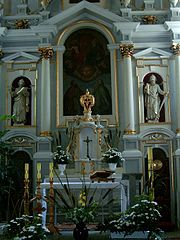
A History Of The Mass And Its Ceremonies In The Eastern And Western Church -Rev John O'Brien A.M.
THE PRACTICE OF THE ORIENTAL CHURCH REGARDING THE CELEBRATION OF MASS
The practice of the Oriental Church regarding the celebration of Mass is somewhat lax; but in so far as relates to the number a single priest may say the same day, if we except the Copts, that Church and ours agree. Daily Mass is very rare in the East, except among the Papal Catholics (as those of our communion are termed), and even in many places there is no celebration on Sunday, unless it be one of great note.
According to the Nestorian Ritual, Mass is prescribed for every Sunday and Friday and every Church festival throughout the year. It is also prescribed every day of the first, middle, and last week of Lent, except Good Friday; daily also the week following Easter. At present, however, Mass is restricted to Sundays and principal holydays; and in some places whole weeks pass without a celebration. The Rev. Geo. Percy Badger, whom we are quoting, says that on some occasions it is the practice for the priest to read the Liturgy, omitting the prayer of consecration and other parts of the office, after the manner of a Dry Mass. This the Nestorians call by the name of d’Sh-heeme, or Simple (Nestorians and their Rituals, vol. ii. p. 243).
Smith and Dwight, in their travels through the East were informed by some Nestorian priests that a whole year sometimes passes without there being any more than three Masses celebrated (Researches in Armenia, vol. ii. p. 230). They state, however, that the more devout celebrate very regularly, especially during the season of Lent.
According to the discipline of the Armenians, daily Mass is enjoined, and is rarely omitted where there is a sufficiency of priests (ibid. 103). Neale, however, flatly contradicts this in his Holy Eastern Church (vol. i. p. 380, note a), where he distinctly states that it is a regulation of the Armenian Church that the Liturgy is not to be celebrated excepting on Saturday and Sunday, and when any great festival of our Lord or his Mother occurs. On ordinary days, instead of Mass, they recite Tierce, Sext, and None of the Divine Office. Neale adds, however, that during Lent celebration is more frequent.
In case of a death occurring Mass is never omitted. The Armenians say one on the day of burial and one on the seventh, fifteenth, and fortieth after death; also one on the anniversary day. This holy practice of praying for the dead and saying Mass in their behalf is very common throughout the entire East, with schismatics as well as Catholics.
According to Pococke, the liturgical days of the Copts are Sundays and holydays, and the Wednesdays and Fridays of the fasting seasons. The same author remarks that, under pretext of not being able to obtain grapes from Cairo for wine purposes, their priests say they cannot celebrate Mass oftener than once a month. These remarks, of course, wholly refer to the schismatic Copts and not to the Catholic. The latter celebrate regularly.
Copyright ©1999-2023 Wildfire Fellowship, Inc all rights reserved

 Keep Site Running
Keep Site Running